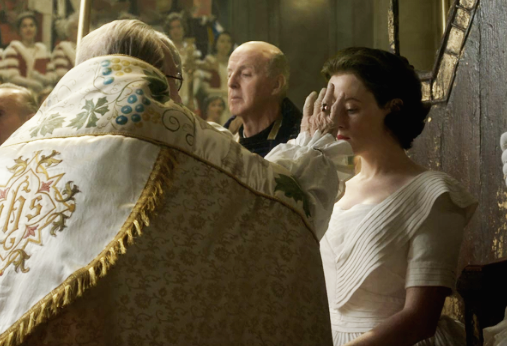During my convalescence from this stroke I have had to rest a lot, and not being too good at that I took the time to re-watch the first two series of The Crown.
Apart from not being able to take my eyes from the lovely Claire Foy, the royal drama is packed with genuine insights about the human condition and the play between mortality and a divine call.
In one of the episodes the future queen is helping her father King George VI prepare for his coronation. He explains to the girl about the solemn moment of anointing in the liturgy. He says that it is God’s anointing and from thereon he will be a different person. Later on in the series we see the anointing of the Queen at her own coronation and the commentary is provided by her dastardly uncle–the king who ran away–Edward VIII. He is watching the televised occasion and explains to those gathered to view with him the significance of the anointing. The same divine call is articulated in a letter and a conversation on her deathbed with Queen Mary–Queen Elizabeth’s grandmother. She says to Elizabeth on the death of her son (the Queen’s father) that from now on Elizabeth Windsor is no more. There is only the crown…the monarchy…Elizabeth the Queen.
The anointing is actually crucial to the underlying tension of the whole series because time and again we watch the conflict between Elizabeth Windsor the wife, daughter, sister and mother–and Elizabeth Regina. So, for instance, she wants to give permission for her sister Margaret to marry the man she loves, but her religion and role of monarch pushes her to refuse permission for Margaret to marry a divorced man. Put bluntly, we see that Elizabeth–the ordinary woman has to sacrifice everything for the greater role to which she has been called and for which she has been anointed.
We also see the disaster of the royals who cannot or will not share this high calling. Edward VIII emerges as a selfish cad, an effete dandy and ultimately a traitor. Margaret falls for the vanity of the royal lifestyle and the allure of a louche and decadent playboy. Later in the series we see Charles fall for the trap of his imagined self importance–becoming an individualist snob and heartless, conceited and pompous buffoon.
As I watched again the Holy Spirit kept whispering to me, “You too have been called and anointed.” The priesthood demands all, and this is one of the deeper reasons for clerical celibacy. You will know that I am a married priest, but I am blessed with a wife who understands that I was a priest first and a husband second. My kids also seem to understand this at an unspoken level. Time and again when the Queen faced the struggle between her own needs as a woman, a wife and family member and that of her calling I kept thinking of the same struggle I, and every priest, must face between our own will and desires and the demands of our calling. We have all witnessed the priests and bishops who avoid this struggle and who fall into the same traps we see the royals in The Crown tumble into: the vain priest, the pompous prelate, Father Fabulous who imposes his wonderful personality on the priesthood–not to mention the narcissist, the autocrat, the hypocrite and the know it all.
For the priesthood to succeed I guess it must be all or nuthin’. It is John the Baptist saying, “He must increase and I must decrease” and St Paul writing, “I have been crucified with Christ and I no longer live, but Christ lives in me. The life I now live in the body, I live by faith in the Son of God, who loved me and gave himself for me.”
The act of anointing and the word “Chrism” is a reminder that Jesus was himself anointed through baptism and the title “Christ” means “the anointed.”
As we celebrate today the institution of the priesthood and the Chrism Mass at which the. Holy Oils are blessed, let it be a reminder that it is not only we priests who are anointed. All of us are anointed at baptism and again at confirmation. All of us are anointed and appointed prophets, kings and priests…remembering I Peter 1:9…
you are a chosen people, a royal priesthood, a holy nation, God’s special possession, that you may declare the praises of him who called you out of darkness into his wonderful light.







Yes! We are all chosen and have the mission. We must pass this faith on.
“Hear oh Israel : the Lord our God is one Lord;
and you shall love the Lord your God with all your heart, and with all your soul, and with all your might. And these words which I command you this day shall be upon your heart.
And you shall teach them diligently to your children, and shall talk of them when you sit in your house, and when you walk by the way, and when you lie down, and when you rise.”